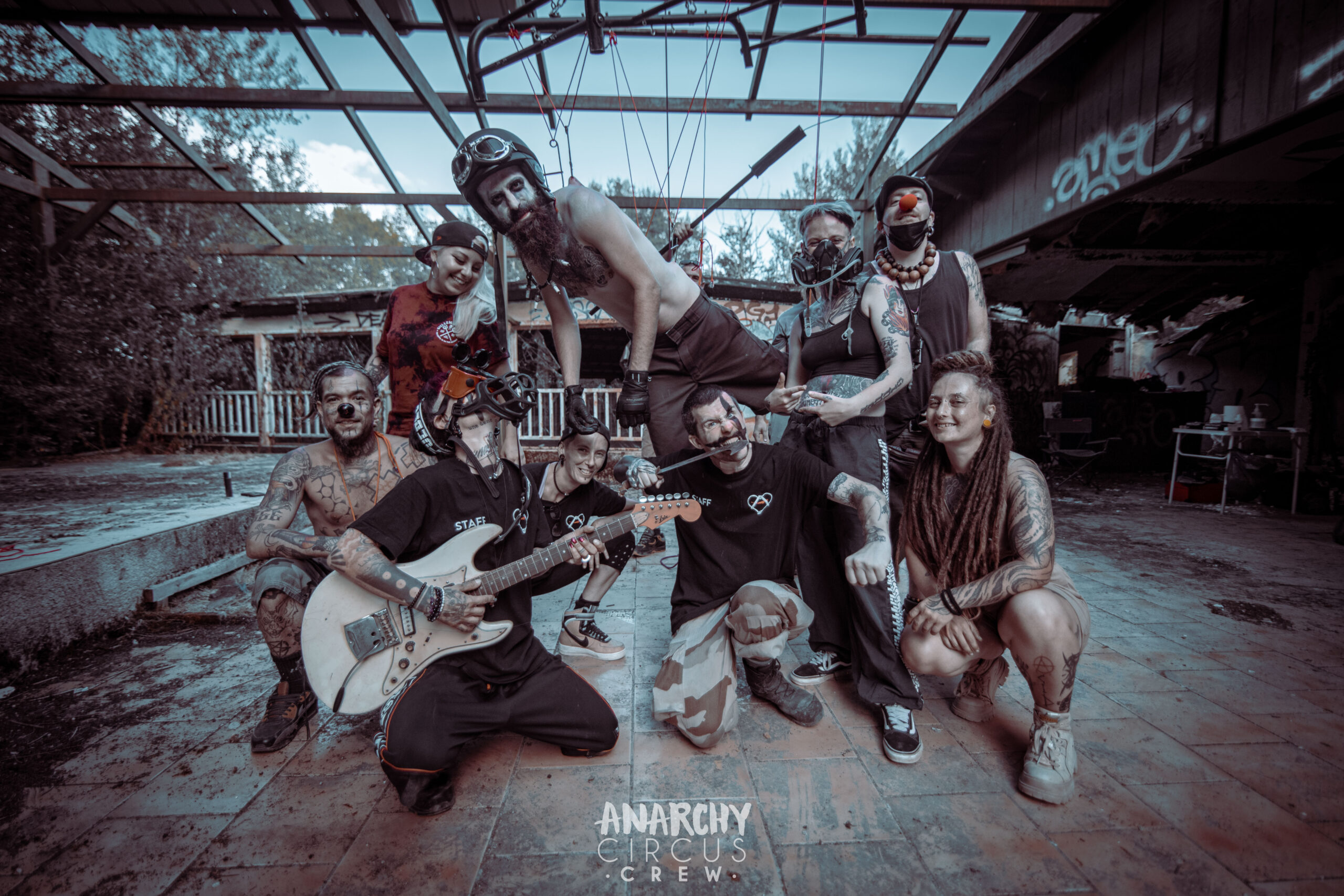Anarchy Circus Crew
Hooks under the skin, levitation in all sorts of positions! You may have discovered the crew’s activities following the Tracks’s episode on Arte!
Originally from the southwest of France, the “Anarchy Circus Crew” reinvents the codes of circus and claims to be a new freak shows through the practice of body suspension!
Thouigh extraordinary shows, the performers overcome their fears as a group, encouraged by bursts of laughter and armed with unfailing kindness!
We met in Toulouse to discuss it in more detail after our meeting at the 30th anniversary of Techno+…
Interview by Polka B. / Translated by Nino Futur / Photos : L’œil du Yak

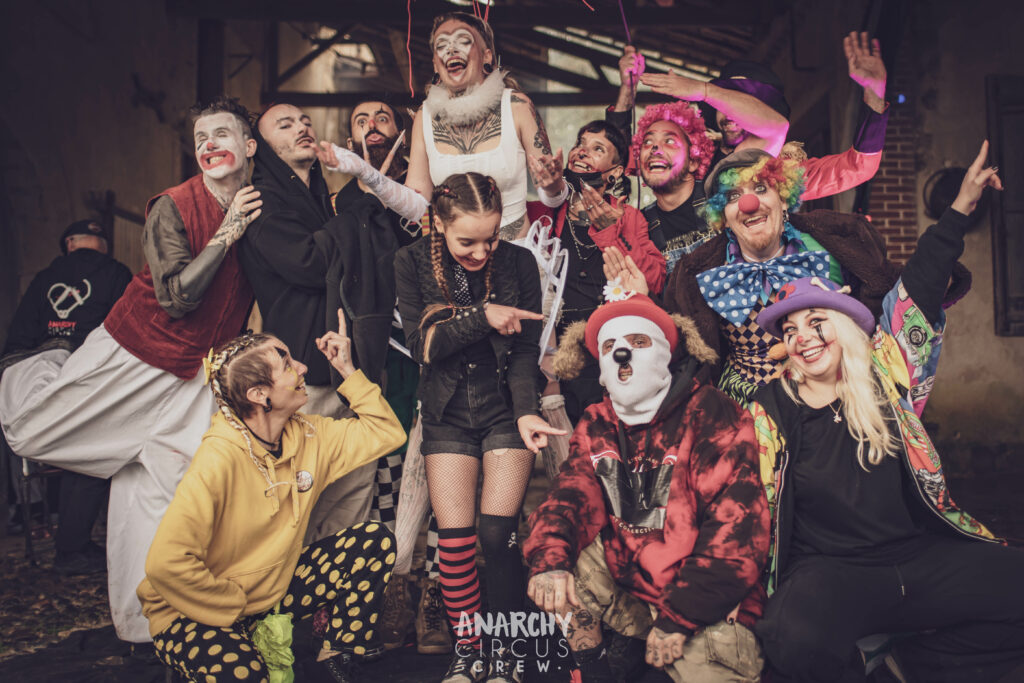
How did the collective started? How did you meet and get together?
Mathieu: I’m originally from Toulouse. When I arrived in the Gers region, Lia tattooed me, scarified me, and we became friends. We started hanging in the attic, just for the thrill of it.
Lia Bagarre: We started with friends. One day, we were invited to a tattoo convention in Belgium. So we imagined a show around suspensions, with costumes and the desire to create a show.
Élise: I just joined the group! I like the family feeling. Everyone is friendly and open-minded. That’s what I like.
Punko: I did my first hanging initiation two years ago now. I really thought it would be the only one! I was really scared. But I did not want to die stupid, so I went for it! Little by little, I started to be conditionned, I did it again and I like this group dynamic.
Why did you choose this circus-themed imagery? How could you describe your world?
Lia Bagarre: It’s very similar to a freak show. We wanted to demystify the practice of hanging itself. At first, people can be a little shocked by the approach. Wearing makeup changes the relationship with the audience. We want to create a more festive, welcoming, and playful feel.
Punko: My costume is a balaclava. For me, it’s a kind of armor. It helps me laugh, share, and be daring. It’s my superhero costume. I can have fun without fear of being judged. We each have our own character. I find the clown figure incredibly empowering. We can laugh, make people laugh, or inspire a slightly disturbing side. It’s a toolbox of emotions.
Mathieu: We’re often called monsters because of our appearance. With this “freak” aspect, we turn the situation to our advantage. It becomes a show in its own right. We manage to reach people in a different way.
Élise: We get this kind of feedback: “If you weren’t wearing makeup, it would have shocked me more.” Bringing a touch of lightness creates a communion. We make cotton candy, candy apples, we decorate with helium balloons… We’re outside of time, and all together.

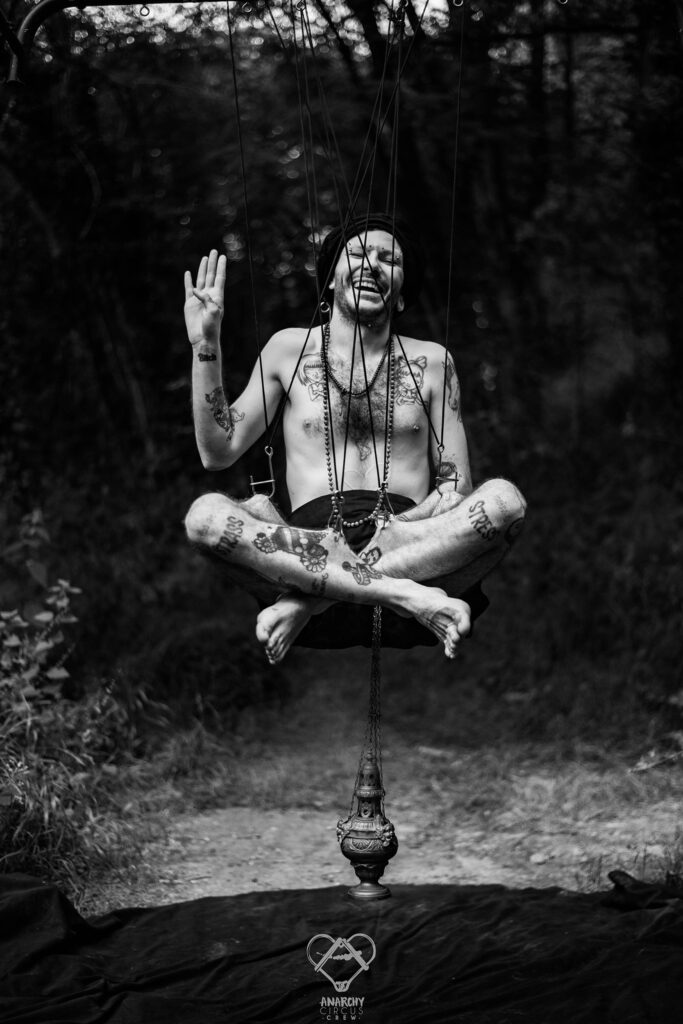
Do you select your audience? In the sense that some people might be shocked by the suspension? Are you aiming for prevention?
Lia Bagarre: We don’t select our audience at all. For me, it’s an art form like any other. I would tend to democratize it everywhere, without question. At the request of the organizers, we put up “For Mature Audiences” signs. Honestly, the audience reacts very well. And the children too, by the way! It’s often the adults who put up themselves the biggest barriers…
Punko: Often, children absorb their parents’ fears. That’s where this de-dramatizing work takes on its full meaning.Élise: The audience is always warned of what’s going to happen. Everyone is free to attend or not!
What do you feel when you do it? Can you feel an addictive thing into it?…
Lia Bagarre: Absolutely! Physically and physiologically: adrenaline, endorphins! Like all people who do extreme sports. Then there’s the whole psychological aspect: pushing yourself to the limit, building confidence, sharing… It creates unique moments, very rich and emotional.
Mathieu: And quite difficult to explain! Once, a girl was hanging in the scorpion position. Arched, with two hooks in her back, and two in her knees. At one point, she removed the hooks from her back to remain suspended only from her knees. With the music playing, the moment became magical, incredible.
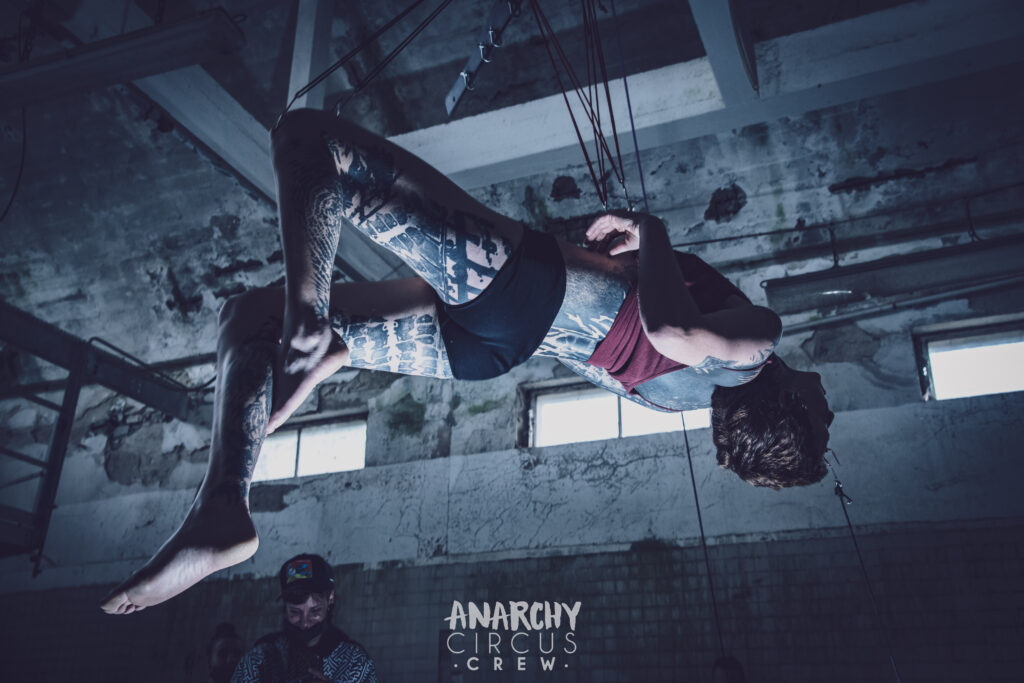
I’d like to talk about the mental preparation that hanging requires. What does it involve? Why is it so important?
Punko: It’s true that for the person hanging, the stakes remain high. So we put ourselves into a bubble, the tone of our voices changes in the 10 minutes before the piercing. Lia takes care of that.
Lia Bagarre: The person getting pierced must be prepared in certain conditions. It’s a battle against oneself. We also refocus, to connect with the person who is to be suspended. It depends on each person’s specificities. Punko is very afraid of needles. Mathieu much less.
Because even if it’s a pleasure for you, practicing suspension is not trivial!
Lia Bagarre: For sure! We must have slept well the night before. We always share a meal before suspensions. Refocus. Accept the pain. We support them in overcoming their pain. We are truly there for the person being suspended.
Mathieu: This preparation time is super important.
Punko: Some people also prefer to be alone during the piercing phase. Personally, feeling surrounded by the whole team really matters to me. It helps me to feel supported, to feel that kindness.

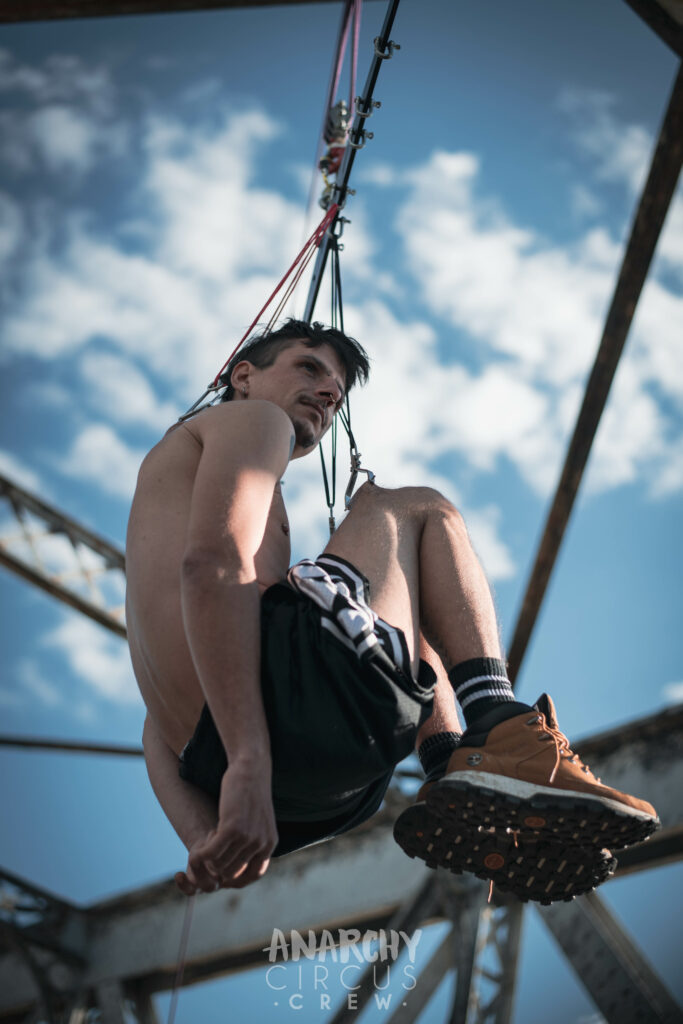
And what’s interesting is that this “dangerous” aspect gives the practice its charm.
Without the notion of pain, the performance would be less impressive, wouldn’t it?
Lia Bagarre: Personally, I don’t see anything dangerous about it. Honestly, the only barrier is mental. The epidermis is very resistant. We know full well that skin can’t crack.
Élise: The body is capable of it. It goes far beyond the practice of suspension. Stress is always present in life. So how do we overcome it to make it something meaningful? That’s what’s appealing about it. It’s a search for oneself.
Punko: And to achieve this transcendence, we take care of each other.
Lia Bagarre: There is pain, and that’s part of the process, but it’s not the primary goal within our team. We’re not masochistic.
Mathieu: When you do it and realize you’re capable of it, it really gets your body and mind in a good place. The moments of pain are actually quite brief. It happens during the piercing and at the moment of detachment. Afterward, you stabilize, and the sensation is quite pleasant!
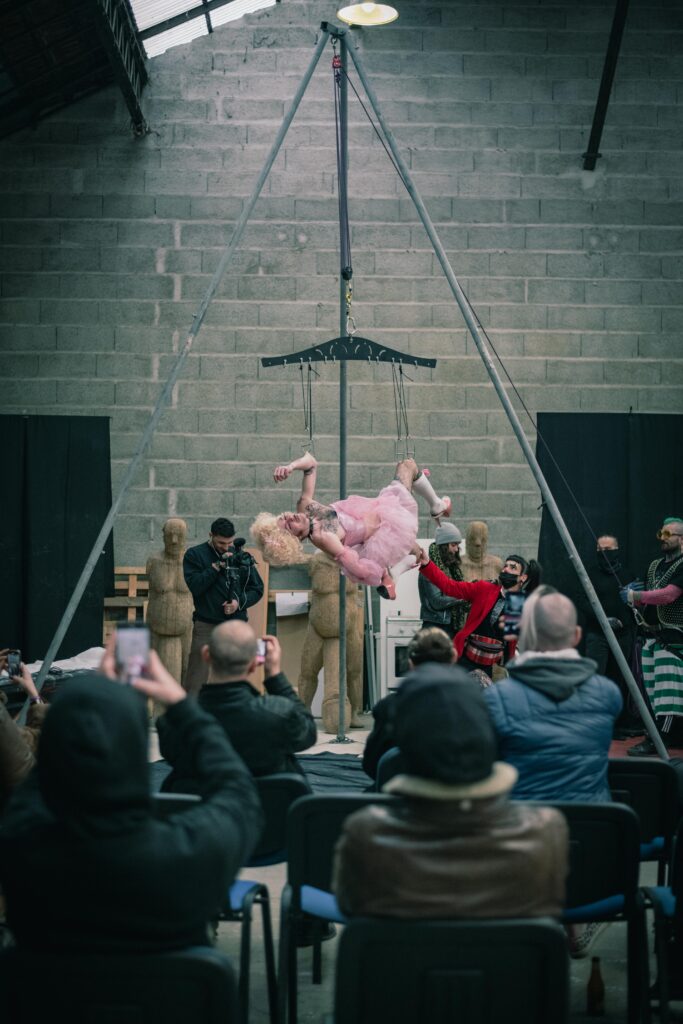
Is it a therapy kind of thing?
Mathieu: Yes, and for all of us! It heals us.
Punko: Even the piercing process is much less painful for me today.
Lia Bagarre: It strengthens us in all areas. Especially psychologically. We feel more ready to face things.Punko: If we can get suspended, we tell ourselves that we’re capable of many things in life. Personally, I take a certain pride in it. Because, as I said, I thought I was incapable to do it at first.
Punko: If we can get suspended, we tell ourselves that we’re capable of many things in life. Personally, I take a certain pride in it. Because, as I said, I thought I was incapable to do it at first.
They say the body has a memory. For example, heavily tattooed people feel the pain of the needle more and more as they get more tattoos.
Is it the same for you?
Punko: I think it’s very different. Tattooing takes a long time. It’s more intense.
Lia Bagarre: We all prefer to get suspended than to get tattooed!
Mathieu: True!!

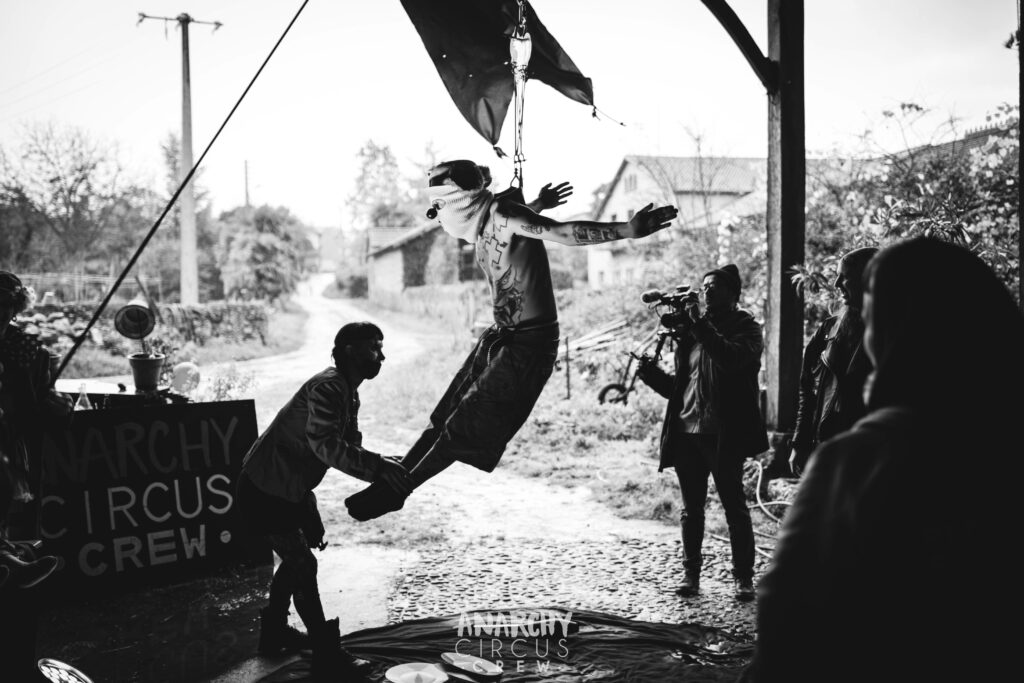
What are your plans for the future?
Lia Bagarre: To continue setting shows and offering introductory sessions. It’s hard to juggle, as we all work aside. We try to maintain at least one session per month. We’d like to do more shows. But we end up not approaching many people… On the other hand, the requests for introductory sessions are exploding!
Thanks, it was very interesting!

